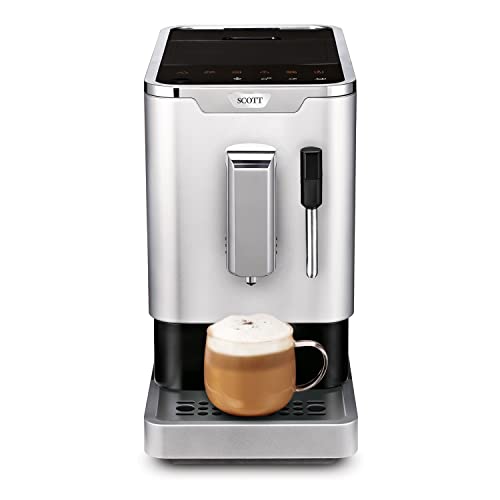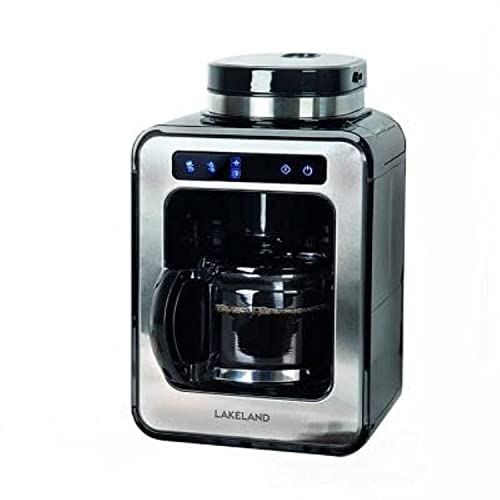What Is The Secret Life Of Coffee Bean Coffee Machine
페이지 정보

본문
 Bean-to-Cup Coffee Machines
Bean-to-Cup Coffee Machines Bean-to-cup machines are great for those mornings where you're groggy and just need to press the button. They provide a certain amount of flexibility to more adventurous drinkers.
Bean-to-cup machines are great for those mornings where you're groggy and just need to press the button. They provide a certain amount of flexibility to more adventurous drinkers.They work by storing whole beans in a hopper, then grinding them prior to brewing and dispense a beverage at the touch of a button. They can serve customers and staff without requiring the skills of a trained barista.
Cost-effectiveness
Each coffee pod has pros and cons, whether you prefer the traditional taste or convenience of pre-packaged pods. Cost-effectiveness is the important factor to consider. Bean-to cup machines are more cost-effective for long-term usage than pod-based models. You can cut down on the cost of recurring expenses by buying high-quality, bulk beans at a lower price than pods. They can also reduce waste by removing the coffee pods.
Bean-to-cup coffee makers are a fantastic option for offices because they're easy to use. bean coffee maker-to-cup coffee makers are a ideal alternative to manual drip coffee makers that require users to grind and prepare beans manually. They produce a smooth, consistent drink with the click of a button. Additionally they are made with low maintenance and cleaning in mind. In addition, they often come with cleaning and rinsing programs that allow you to ensure they are running smoothly.
The primary benefit of a bean-to-cup machine is its ease of use. It is simple to set up and use and doesn't require any previous training. It features a built-in grinder and often includes an automatic milk frother, making it ideal for businesses with a small staff. It also provides high-quality espresso at the touch of the button. This is particularly convenient for offices that are busy.
While it may be more expensive to purchase a bean-to-cup machine as opposed to a pod model it will save money over the long term by reducing the cost of supplies and lowering energy costs. It is also more environmentally sustainable than pod-based machines since it generates less waste and uses less resources.
Coffee is a great way to boost productivity and morale. Installing a bean-to-cup cup machine in your breakroom, you'll create a space that encourages collaboration and teamwork. Additionally it can promote interaction between your employees through informal conversations. In these discussions employees can share their thoughts and come up with innovative solutions to problems. A quick cup of coffee will also provide you with a boost of energy and spark your imagination.
Convenience
Bean-to-cup coffee machines are an economical way to serve high-quality coffee at the touch of one button. They are easy-to-use and require little maintenance. They have built-in grinders which ensure the beans are freshly ground for every cup. They can be programmed to create a variety drinks, including hot and iced drinks, at the touch of a button. This lets you make various drinks for your customers and employees.
A bean-to-cup machine can also save you money by reducing the need for paper filters and plastic cups. It also reduces the amount coffee grounds that end in the trash. If you're an environmentally conscious individual, you can use a coffee bean machine that offers organic whole beans for a more sustainable experience.
In contrast to pod coffee machines, that require a certain level of proficiency to operate, a bean-to-cup machine can be operated by anyone with a minimum or no training. The user simply must fill the bean hopper and the water tank before choosing the drink they want from the machine's easy-to-use control panel. Certain coffee bean machines allow you to adjust the strength and temperature.
The pod coffee machines utilize pre-ground, powdered coffee The bean-to-cup coffee maker grinds whole beans prior to brewing each cup of coffee. This preserves the flavour and aroma of the beans, leading to a more authentic taste and texture. These machines can also tailor each cup of espresso to the user by observing their preferences over time. The Barista TS Smart is an example of machine that can be programmed to make 21 different types of coffee, from espresso to long black.
A bean-to-cup coffee machine can also run rinse cycles before turning off and when it is first switched on, to help prevent the build-up of coffee residues on milk dispenser and spouts. It also has an internal container for the milk and coffee grounds that are used up. This bin doesn't need to be cleaned out every day and typically will have an indication on the screen when it's full.
Freshness
Fresh-brewed coffee isn't just delicious but also offers a variety of health benefits. It can increase the metabolism, lower the risk of heart disease and provide an energy boost naturally. But it is essential to select the right beans for your machine. Choose whole bean coffees with a clearly marked roast date to ensure the highest quality and flavor for your coffee. This is essential for bean-to cup machines that require freshly roasted, ground coffee beans. Coffee beans that are stale will have bitter taste and lack flavor.
The shelf life of whole coffee beans is affected by a variety of factors including temperature and storage conditions. When stored properly, unopened bags of whole coffee beans can last for up to six months from the time of roasting. However, once the beans are ground, their shelf life decreases dramatically due to the larger surface area which exposes them to oxygen. It is generally recommended to use beans freshly ground within two weeks of opening or grinding.
The appearance of coffee beans is another method to determine whether or not your coffee bean coffee machine is fresh. Fresh, whole beans will have a shiny appearance whereas older coffee beans appear dull and dry. The smell of the beans can aid in determining whether they are fresh or not.
When coffee beans are roast, they release volatile aromatic oils which imparts the taste of the bean. These oils are the reason for the distinctive aroma of each coffee, and if they are depleted of their potency, the flavor of the brewed coffee will be affected. To avoid this, it is important to buy coffee beans with a a clear roast date and to keep them in a sealed container.
It is also recommended to grind the coffee only a few days before the date you intend to make it. This will minimize the process of oxidation and ensure that you get the best value bean to cup coffee machine flavor you can get. To get the best bean to cup Coffee machine uk results, don't store roasted coffee beans in the freezer, as this can cause structural damage and moisture accumulation.
The hopper is a vital element of any bean-to-cup machine and must be cleaned regularly in order to get rid of any dirt and water. Cleaning the hopper can help keep it clear of blockages and improve the overall performance of the machine. This can be done by taking the hopper out of the machine daily and washing it with hot water, and wiping it clean using a cloth to get rid of dust and buildup.
Sustainability
The most sustainable option is to buy beans that have been cultivated and processed sustainably, whether you're using an instant cup filter, capsule, or. If you choose brands that are sustainable or purchasing beans that are UTZ or fair trade certified, you will reduce the amount of waste generated in the roasting and packaging processes. These certifications guarantee that the farmers who grow the beans receive adequate wages and work conditions.
Coffee beans are the largest source of greenhouse gas emissions. The amount can vary between 40 and 80%. Large corporations use intensive pesticides and irrigation to boost yield. This leads to deforestation and contamination of water sources. Also, it kills numerous species. It also causes soil erosion to increase which affects the soil's condition and can cause climate change.
When you choose a bean-to-cup machine, you will reduce your coffee's carbon footprint by eliminating the necessity for paper cups and plastic pods. You can go one step further and share the machine with a coworker to cut down on the amount of energy it takes to make your morning cup. Another method to lessen your coffee's environmental impact is to purchase a sustainable, refillable pod that can be used a number of times.
The increased focus on sustainability has made espresso machines more efficient, with many now making use of less electricity than they previously did. Some of them are also made of recycled materials, and you might even find ones that are 100% compostable. This means that they'll transform into biomaterials within 84 days after disposal. You can also help avoid adding to the problem of waste by encouraging your colleagues to use mugs and reusable tumblers, and by offering coffee grounds to compost. You can also assist by donating money to charities that work to support sustainable coffee production. In addition, you can reduce the environmental impact of your coffee by avoiding the use of single-use items such as stirrers and sugar.
- 이전글What's The Job Market For Mesothelioma Attorney Professionals? 24.09.15
- 다음글How Three Wheeled Buggies Has Become The Most Sought-After Trend In 2023 24.09.15
댓글목록
등록된 댓글이 없습니다.